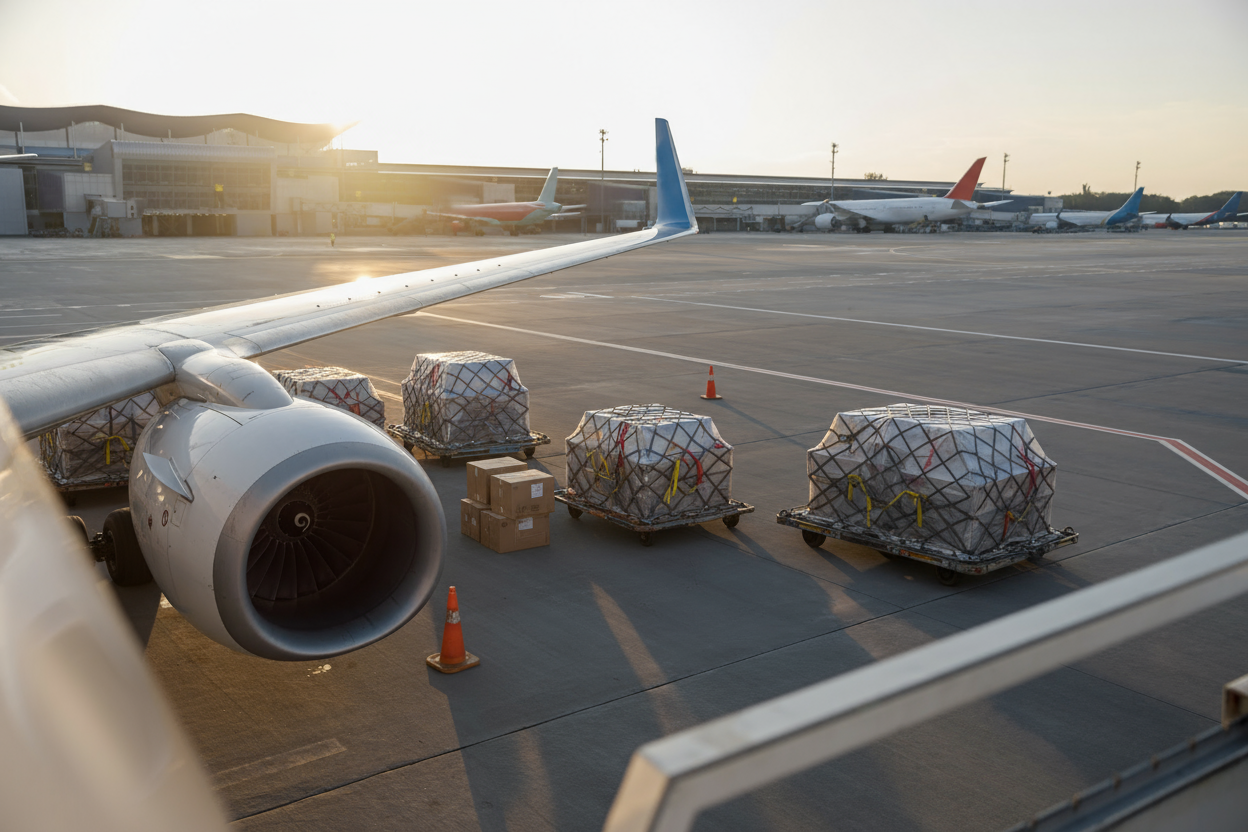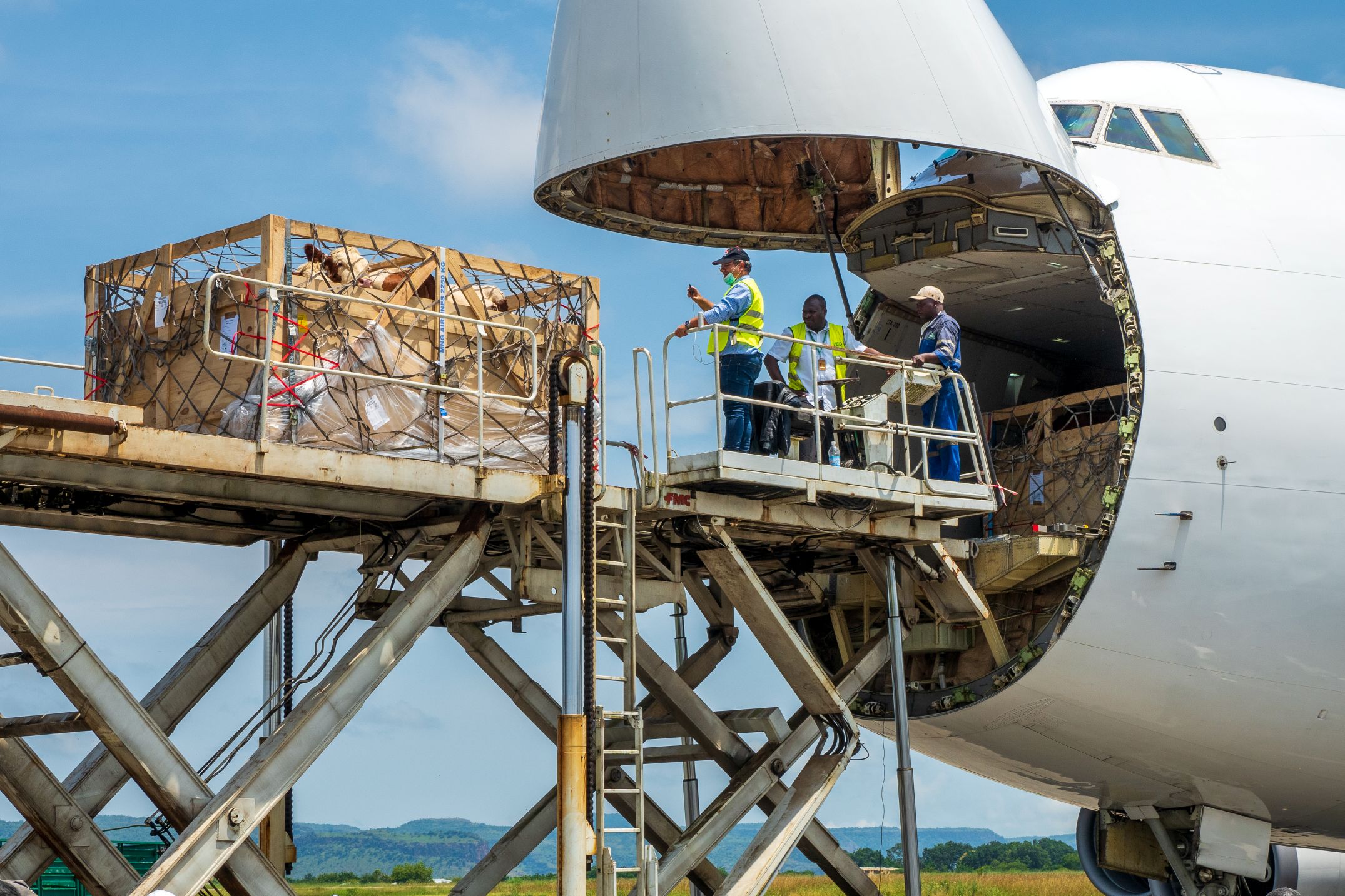The global air cargo industry moves over 60 million tons of freight annually, worth approximately $6 trillion. Yet beneath this massive economic engine lies a complex digital ecosystem increasingly vulnerable to sophisticated cyber attacks. As supply chains become more interconnected and data-dependent, cybersecurity in air cargo logistics has emerged as a critical business imperative that can no longer be treated as an afterthought.
At BlueX GSSA, we’ve witnessed firsthand how cybersecurity breaches can devastate logistics operations, causing delays, financial losses, and damaged client relationships. Our comprehensive approach to cybersecurity in air cargo logistics combines advanced technology solutions with deep industry expertise to create robust defense systems that evolve with emerging threats.
The Evolving Threat Landscape in Air Cargo
Cybercriminals have shifted their focus toward logistics and transportation sectors because these industries offer multiple attack vectors and high-value targets. The interconnected nature of modern air cargo operations creates numerous entry points for malicious actors seeking to exploit vulnerabilities.
Data Breaches and Information Theft
Air cargo operations generate massive amounts of sensitive data, including shipping manifests, customer information, financial records, and operational schedules. Cybercriminals target this information for various purposes, from identity theft to competitive intelligence gathering. According to IBM’s Cost of a Data Breach Report 2023, transportation companies face average breach costs of $4.5 million, significantly impacting operational budgets and customer trust.
BlueX GSSA implements multi-layered data protection protocols that encrypt sensitive information both in transit and at rest, ensuring top-tier cybersecurity in air cargo logistics. Our systems continuously monitor data access patterns, alerting security teams to unusual activity that might indicate unauthorized access attempts.
Ransomware Attacks on Logistics Infrastructure
Ransomware has become the most feared cybersecurity threat in air cargo logistics, capable of shutting down entire operations within hours. These attacks often target critical systems like warehouse management software, tracking platforms, and booking systems, bringing cargo movements to a complete halt.
Recent high-profile attacks on logistics companies demonstrate the devastating impact of ransomware. When systems go down, cargo sits stranded, deliveries are delayed, and companies face millions in lost revenue. Our incident response protocols ensure rapid containment and recovery, minimizing downtime and protecting client operations.
Supply Chain Infiltration
Sophisticated attackers now target third-party vendors and partners to gain access to larger logistics networks. This supply chain infiltration approach allows cybercriminals to bypass direct security measures by exploiting weaker links in the extended network, highlighting the growing importance of cybersecurity in air cargo logistics.
BlueX GSSA addresses this challenge through comprehensive vendor risk assessments and continuous monitoring of all connected systems. We work closely with partners to ensure consistent security standards across the entire supply chain ecosystem.
Technology Vulnerabilities in Modern Air Cargo Operations
The digital transformation of air cargo logistics has introduced numerous technological touchpoints, each presenting potential security vulnerabilities that require specialized protection strategies.
Internet of Things (IoT) Devices
Modern air cargo operations rely heavily on IoT sensors for tracking temperature, humidity, location, and other critical parameters. While these devices provide valuable operational insights, they also highlight the importance of cybersecurity in air cargo logistics, as they create additional attack surfaces that cybercriminals can exploit.
Many IoT devices in logistics environments lack robust security features, making them attractive targets for botnet recruitment or network infiltration. Our security framework includes dedicated IoT device management protocols that ensure proper authentication, encryption, and monitoring of all connected sensors and tracking devices.
Cloud Infrastructure Dependencies
The shift toward cloud-based logistics management systems offers numerous operational benefits but also introduces new cybersecurity considerations. Misconfigured cloud settings, inadequate access controls, and shared responsibility model confusion can create serious vulnerabilities.
BlueX GSSA’s cloud security expertise ensures proper configuration and monitoring of cloud-based systems. In the realm of cybersecurity in air cargo logistics, we implement zero-trust architecture principles that verify every access request, regardless of location or user credentials, providing comprehensive protection for cloud-hosted applications and data.
Legacy System Integration
Many established air cargo operators continue using legacy systems that weren’t designed with modern cybersecurity threats in mind. Integrating these older systems with newer digital platforms often creates security gaps that require specialized attention.
Our approach to legacy system protection involves implementing network segmentation, additional monitoring layers, and custom security controls that bridge the gap between old and new technologies without compromising operational efficiency.
BlueX GSSA’s Comprehensive Cybersecurity Framework
Understanding that cybersecurity in air cargo logistics requires more than just technology solutions, BlueX GSSA has developed a comprehensive framework that addresses people, processes, and technology components of security management.
Risk Assessment and Vulnerability Management
Every client engagement begins with a thorough cybersecurity risk assessment that identifies potential vulnerabilities across all operational systems. Our team evaluates current security postures, identifies gaps, and prioritizes remediation efforts based on business impact and threat likelihood, ensuring robust cybersecurity in air cargo logistics.
We utilize advanced vulnerability scanning tools and manual penetration testing techniques to uncover weaknesses that automated systems might miss. This comprehensive approach ensures that security investments focus on the most critical areas first.
Incident Response and Business Continuity
When cybersecurity incidents occur, rapid response capabilities determine the difference between minor disruptions and major operational disasters. BlueX GSSA maintains 24/7 security operations centers staffed with experienced incident response professionals who can quickly contain and remediate security events.
Our business continuity planning ensures that critical operations can continue even during active cybersecurity incidents. We specialize in cybersecurity in air cargo logistics, working with clients to develop backup procedures, alternative communication channels, and recovery protocols that minimize business disruption.
Employee Training and Security Awareness
Human error remains one of the leading causes of cybersecurity breaches in logistics operations. The Verizon Data Breach Investigations Report consistently shows that social engineering and phishing attacks succeed because employees lack proper cybersecurity awareness.
BlueX GSSA provides comprehensive security awareness training programs tailored specifically for air cargo logistics environments. These programs cover common attack vectors, proper handling of sensitive information, and incident reporting procedures that empower employees to become active participants in cybersecurity defense.
Industry Compliance and Regulatory Considerations
The air cargo industry operates under numerous regulatory frameworks that include specific cybersecurity requirements. Compliance with these standards isn’t just about avoiding penalties; it’s about implementing proven security practices that protect operations and customer data. Cybersecurity in air cargo logistics is essential to ensuring the safety and reliability of the industry’s operations.
Transportation Security Administration (TSA) Requirements
TSA regulations include specific cybersecurity requirements for air cargo operators, particularly those handling sensitive shipments. These requirements cover system access controls, data protection measures, and incident reporting procedures.
BlueX GSSA helps clients navigate these complex regulatory requirements while implementing security measures that exceed minimum compliance standards. Our approach ensures that compliance efforts contribute to overall security posture rather than just checking regulatory boxes.
International Air Transport Association (IATA) Standards
IATA has developed comprehensive cybersecurity guidelines for air cargo operations, recognizing the critical importance of information security in maintaining industry reliability and customer confidence.
Our team stays current with evolving IATA standards and helps clients implement these best practices across their operations. This includes regular security assessments, staff training programs, and technology upgrades that align with industry-wide security initiatives in cybersecurity in air cargo logistics.
Emerging Threats and Future Preparedness
Cybersecurity in air cargo logistics continues evolving as new technologies emerge and threat actors develop more sophisticated attack methods. BlueX GSSA maintains active threat intelligence programs that monitor emerging risks and prepare defensive strategies before new threats become widespread.
Artificial Intelligence and Machine Learning Attacks
As AI and ML technologies become more prevalent in logistics operations, cybercriminals are developing attacks that specifically target these systems. Adversarial AI attacks can manipulate machine learning algorithms, causing incorrect decisions that disrupt operations or compromise security.
Our research and development teams continuously evaluate emerging AI security threats and develop countermeasures that protect client systems without limiting the operational benefits of these advanced technologies, ensuring robust cybersecurity in air cargo logistics.
Quantum Computing Implications
The eventual arrival of practical quantum computing will fundamentally change cybersecurity landscapes across all industries. Current encryption methods may become vulnerable to quantum attacks, requiring entirely new approaches to data protection.
BlueX GSSA is actively preparing for this quantum transition by evaluating quantum-resistant encryption technologies and developing migration strategies that will protect client data when quantum threats become reality.
Building Resilient Air Cargo Operations
Effective cybersecurity in air cargo logistics requires more than just preventing attacks; it demands building resilient operations that can adapt to new threats while maintaining efficient cargo movements. According to McKinsey Global Institute research, companies with mature cybersecurity programs experience 23% fewer security incidents and recover 50% faster when incidents do occur.
BlueX GSSA’s approach focuses on creating adaptive security architectures that grow stronger over time. We implement continuous monitoring systems that learn from each security event, improving detection capabilities and response procedures through experience.
Strategic Technology Integration
Rather than treating cybersecurity as a separate concern, we integrate security considerations into every aspect of technology planning and implementation. This approach ensures that cybersecurity in air cargo logistics and other areas supports business objectives while providing comprehensive protection.
Our technology integration services include security architecture reviews, secure development practices, and ongoing security validation that ensures new systems meet both operational and security requirements from day one.
Partnership and Collaboration
Cybersecurity in air cargo logistics benefits from industry-wide collaboration and information sharing. BlueX GSSA participates in various industry security forums and threat intelligence sharing programs that enhance our ability to detect and respond to emerging threats.
These collaborative relationships provide early warning systems for new attack patterns and allow rapid deployment of countermeasures across client operations. The Cybersecurity and Infrastructure Security Agency emphasizes the importance of public-private partnerships in protecting critical transportation infrastructure.
Moving Forward with Confidence
The future of air cargo logistics depends on the successful integration of operational efficiency with robust cybersecurity practices. Companies that prioritize cybersecurity in air cargo logistics as a competitive advantage rather than just a necessary cost will lead their industries in both security posture and business performance.
BlueX GSSA continues investing in advanced cybersecurity technologies, threat intelligence capabilities, and skilled security professionals who understand the unique challenges facing air cargo operations. Our commitment extends beyond protecting individual clients to strengthening the entire industry’s resilience against evolving cyber threats.
As global supply chains become increasingly digital and interconnected, cybersecurity in air cargo logistics will only grow in importance. Organizations that proactively address these challenges today will be better positioned to capitalize on future opportunities while maintaining the trust of customers, partners, and regulatory authorities.
The path forward requires continuous adaptation, strategic investment in security capabilities, and partnership with experienced cybersecurity providers who understand the complexities of cybersecurity in air cargo logistics. BlueX GSSA stands ready to guide clients through this evolving landscape, ensuring that cybersecurity enhances rather than hinders operational excellence.
Contact BlueX GSSA today to learn how our comprehensive cybersecurity solutions can protect your air cargo operations while supporting your business growth objectives. Together, we can build a more secure and resilient future for global logistics.





